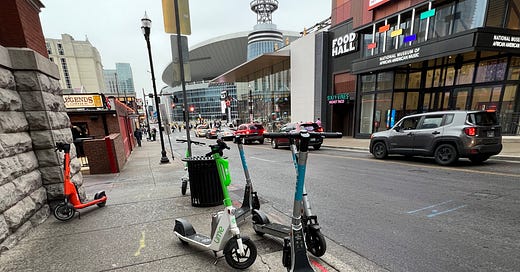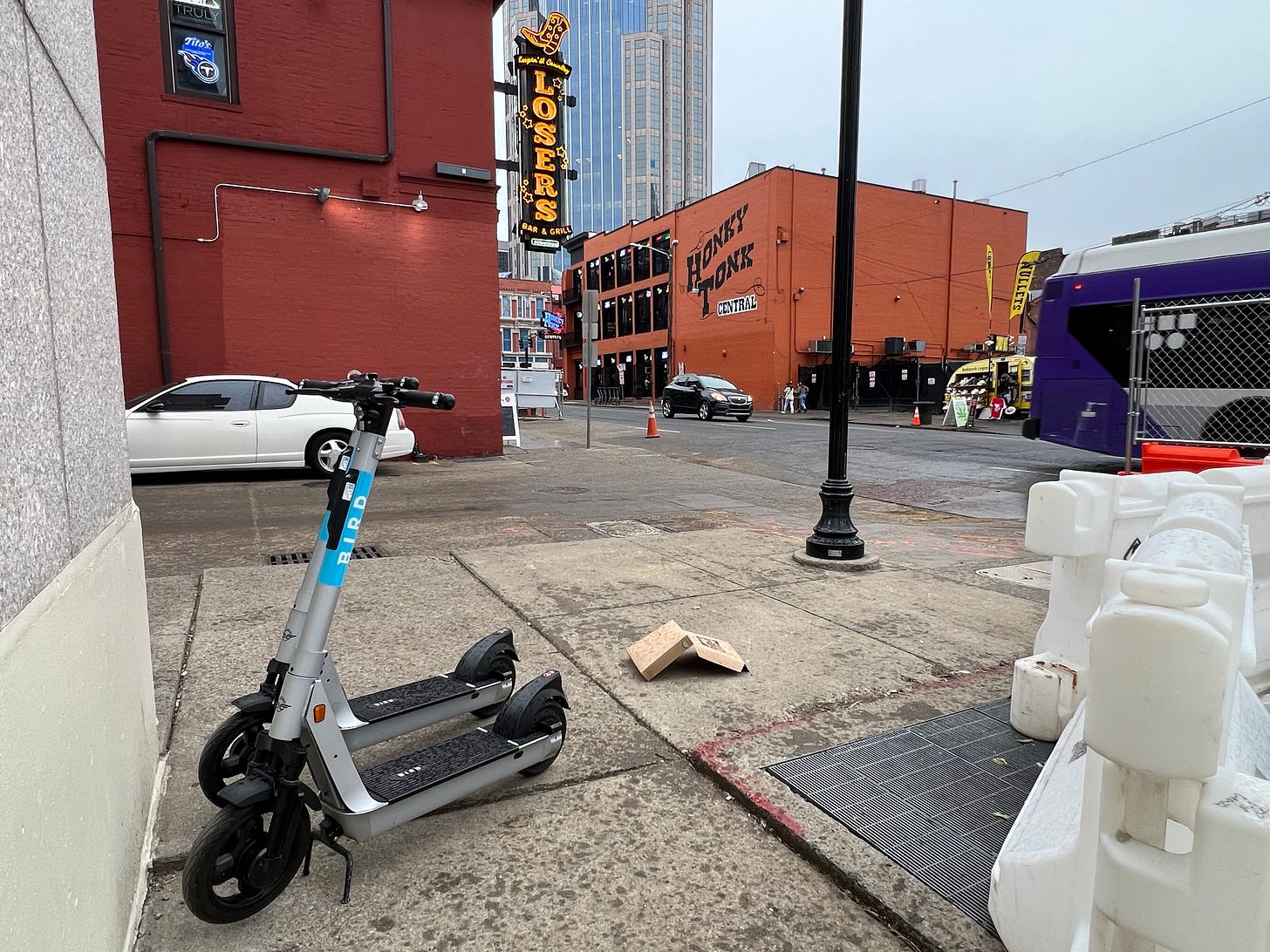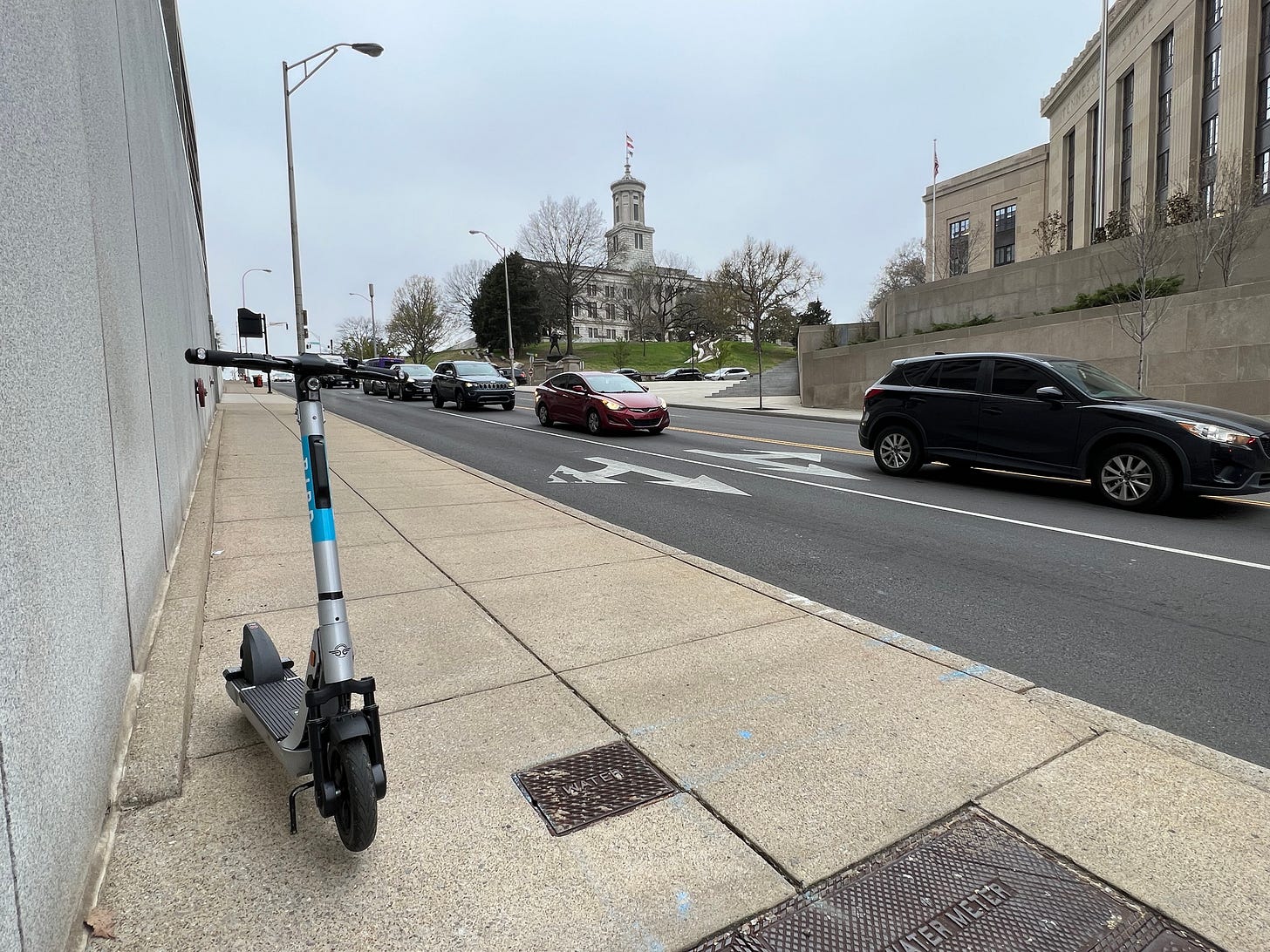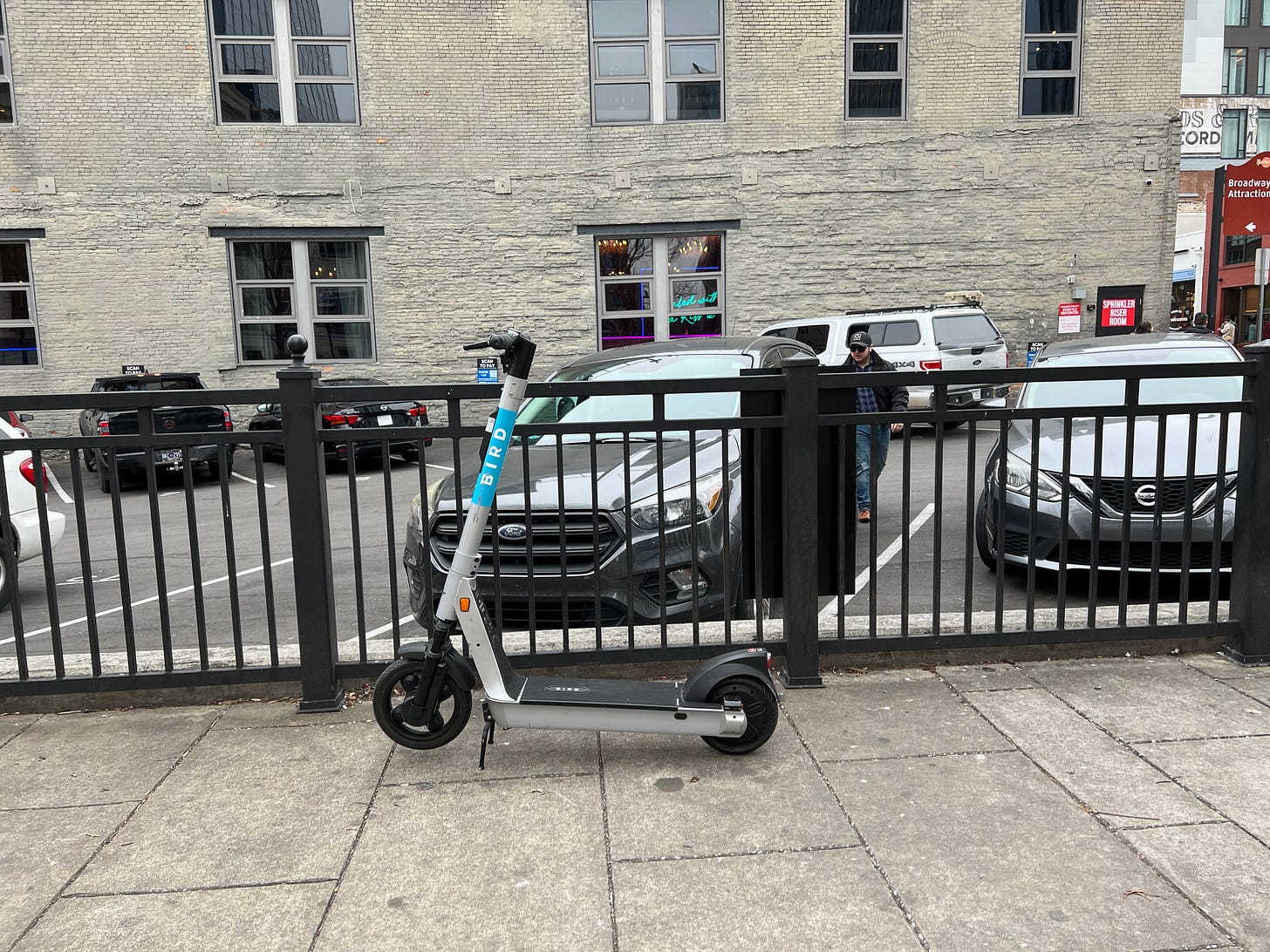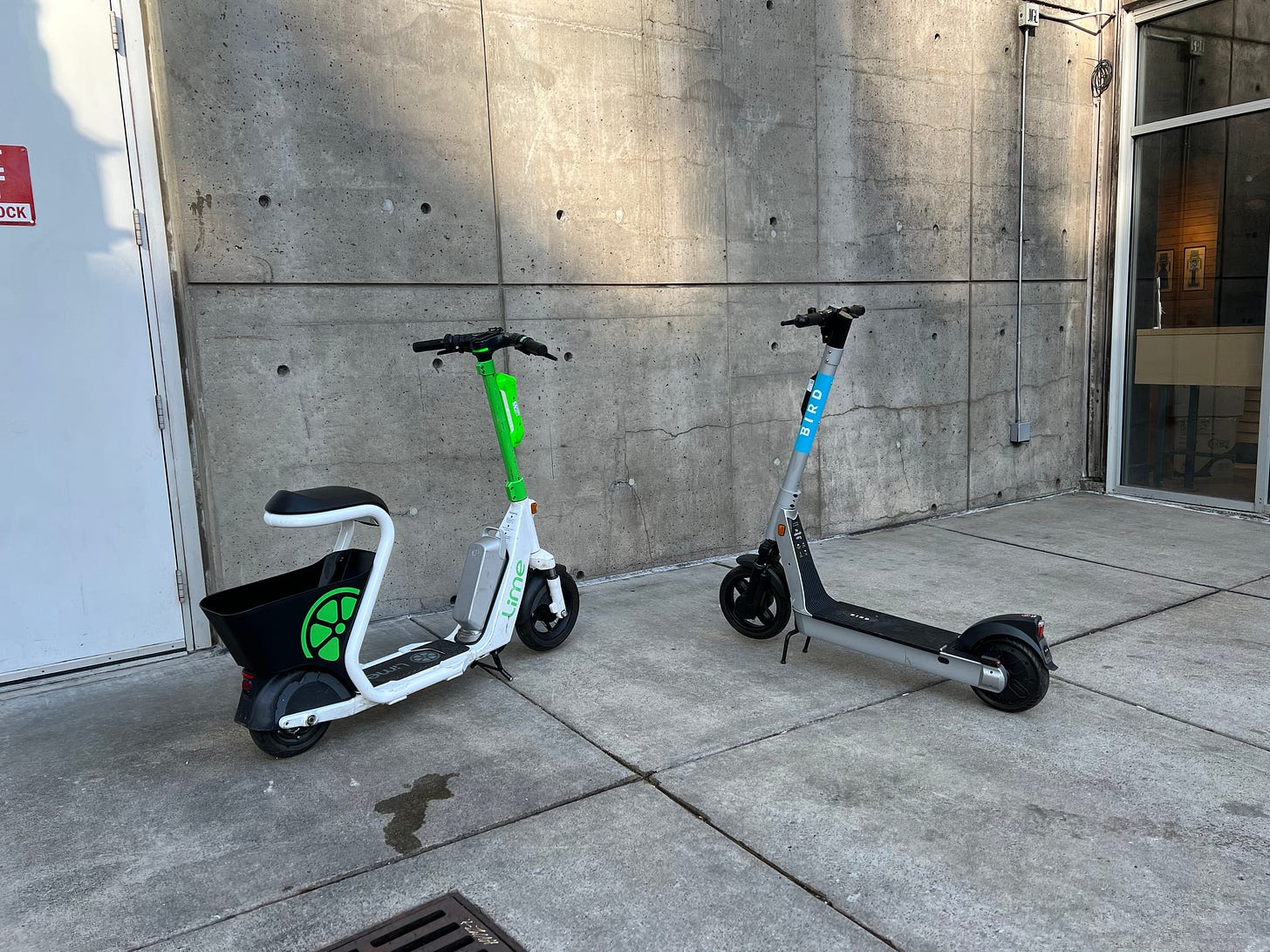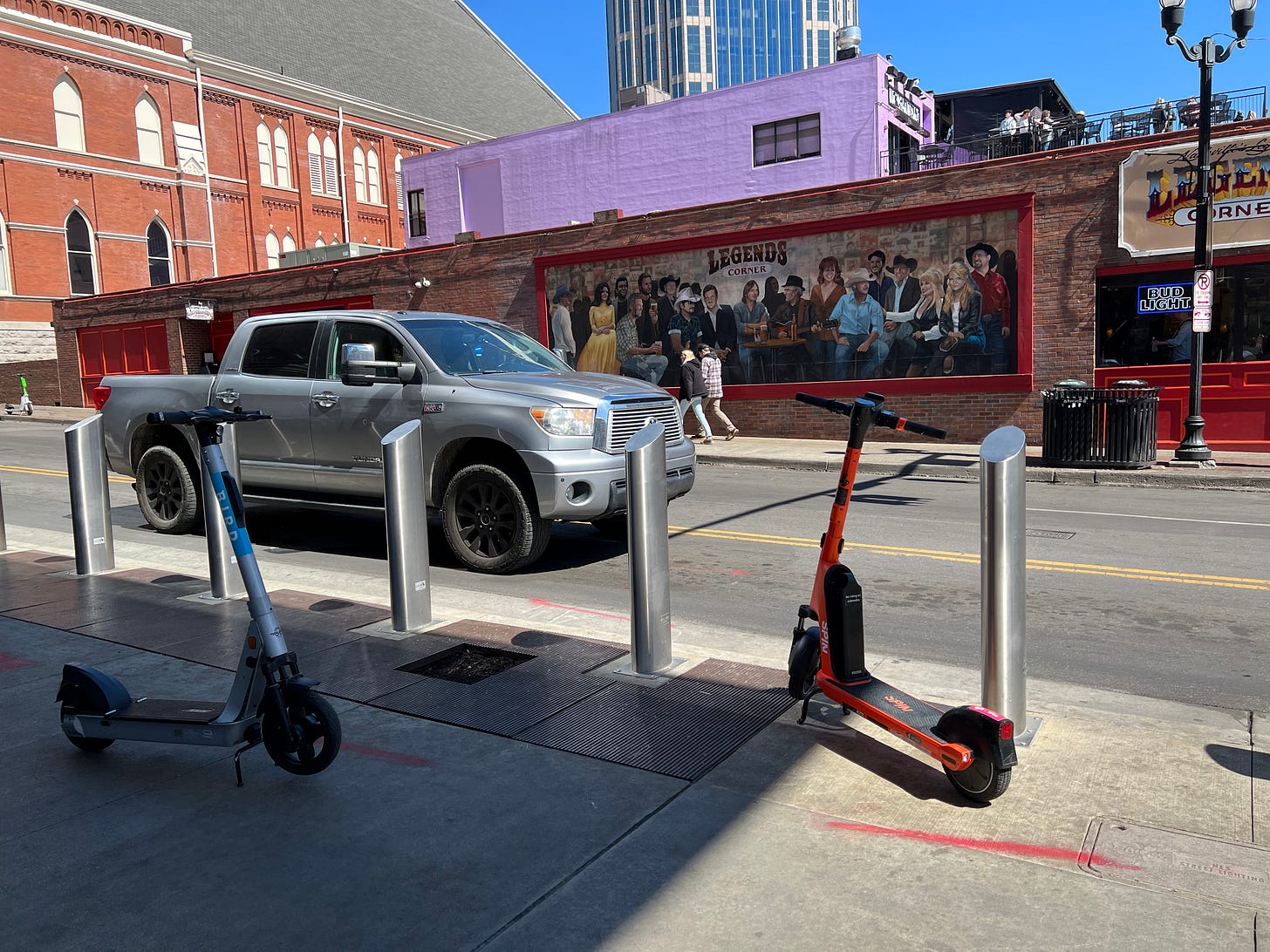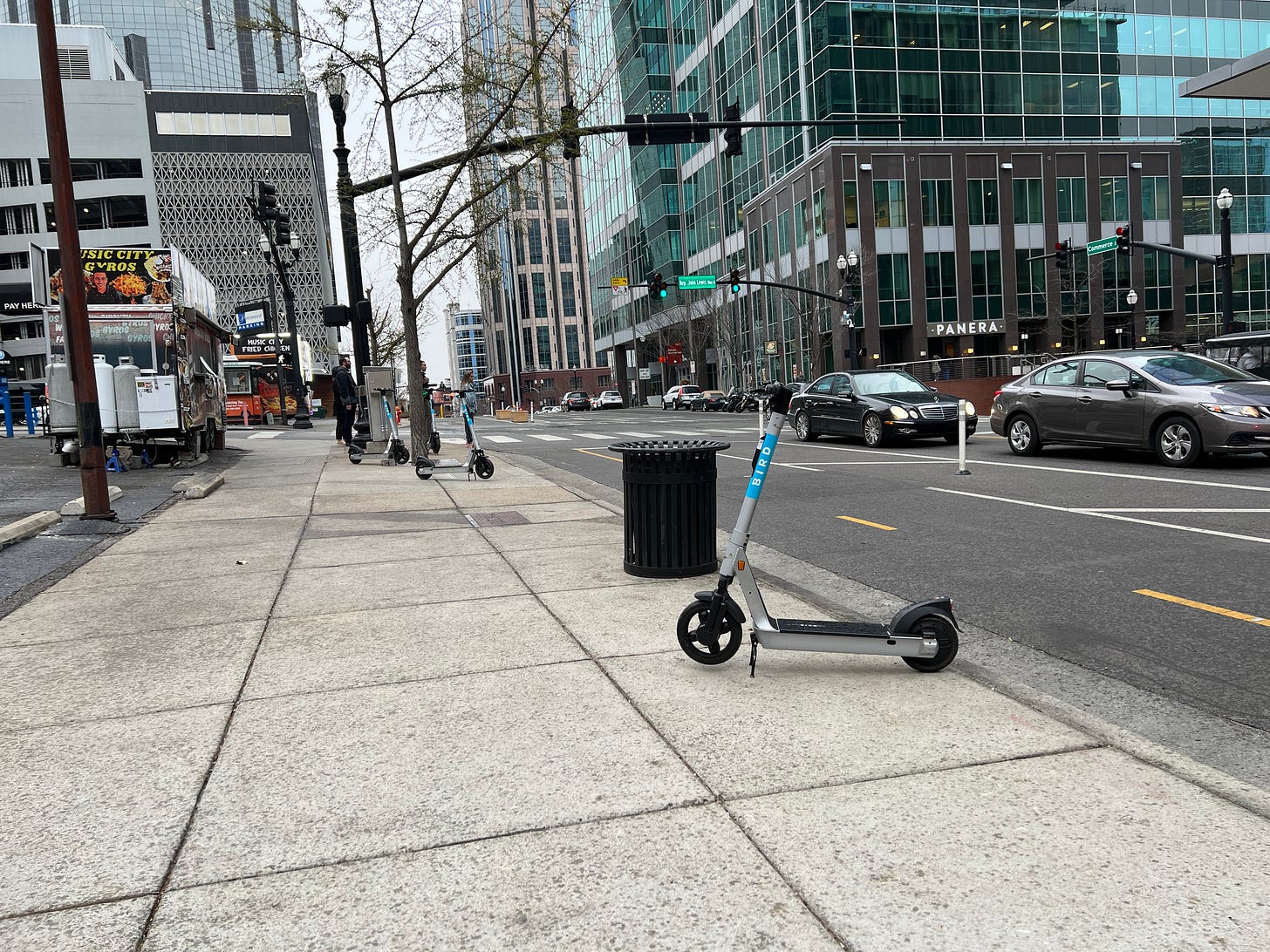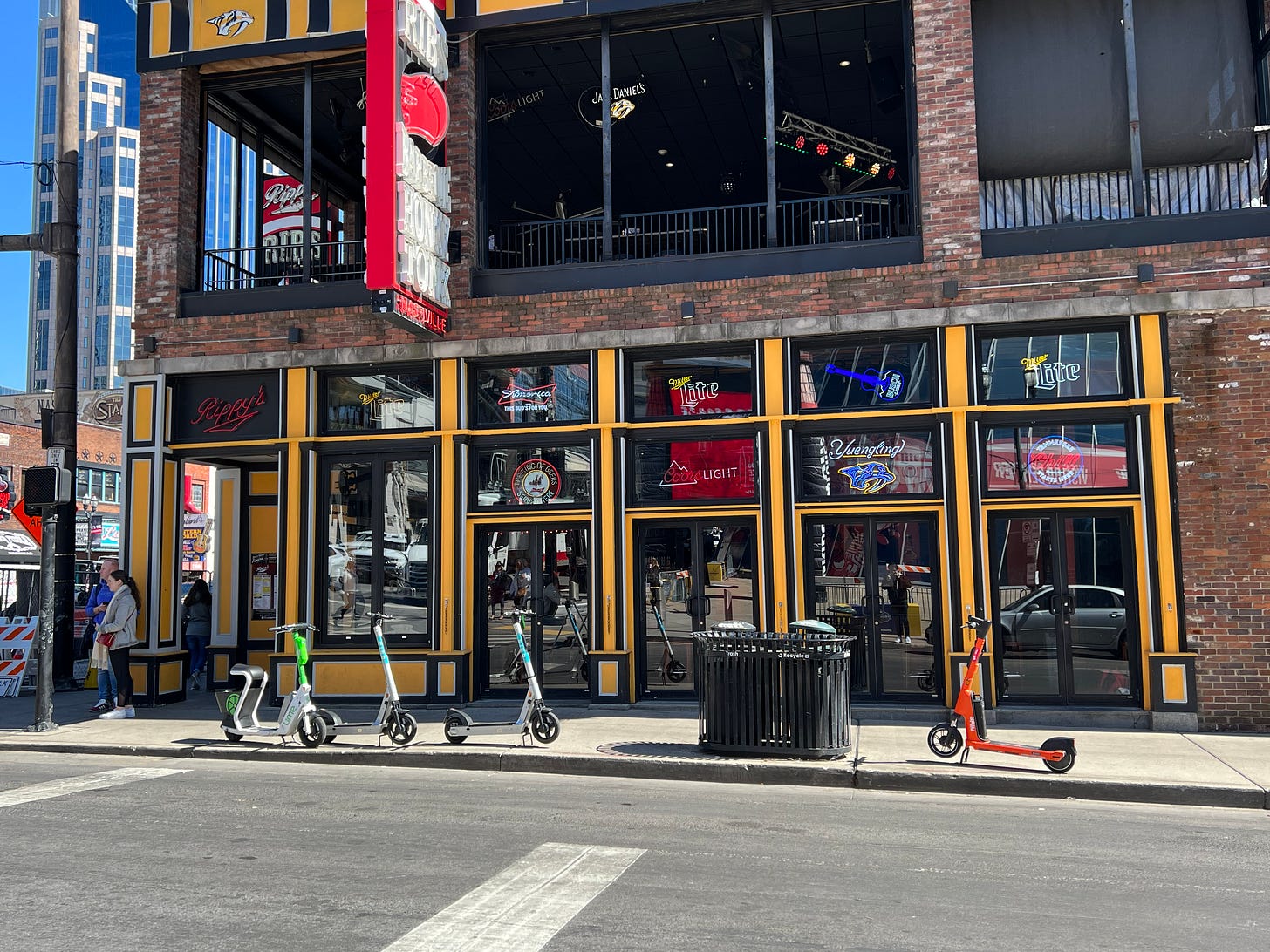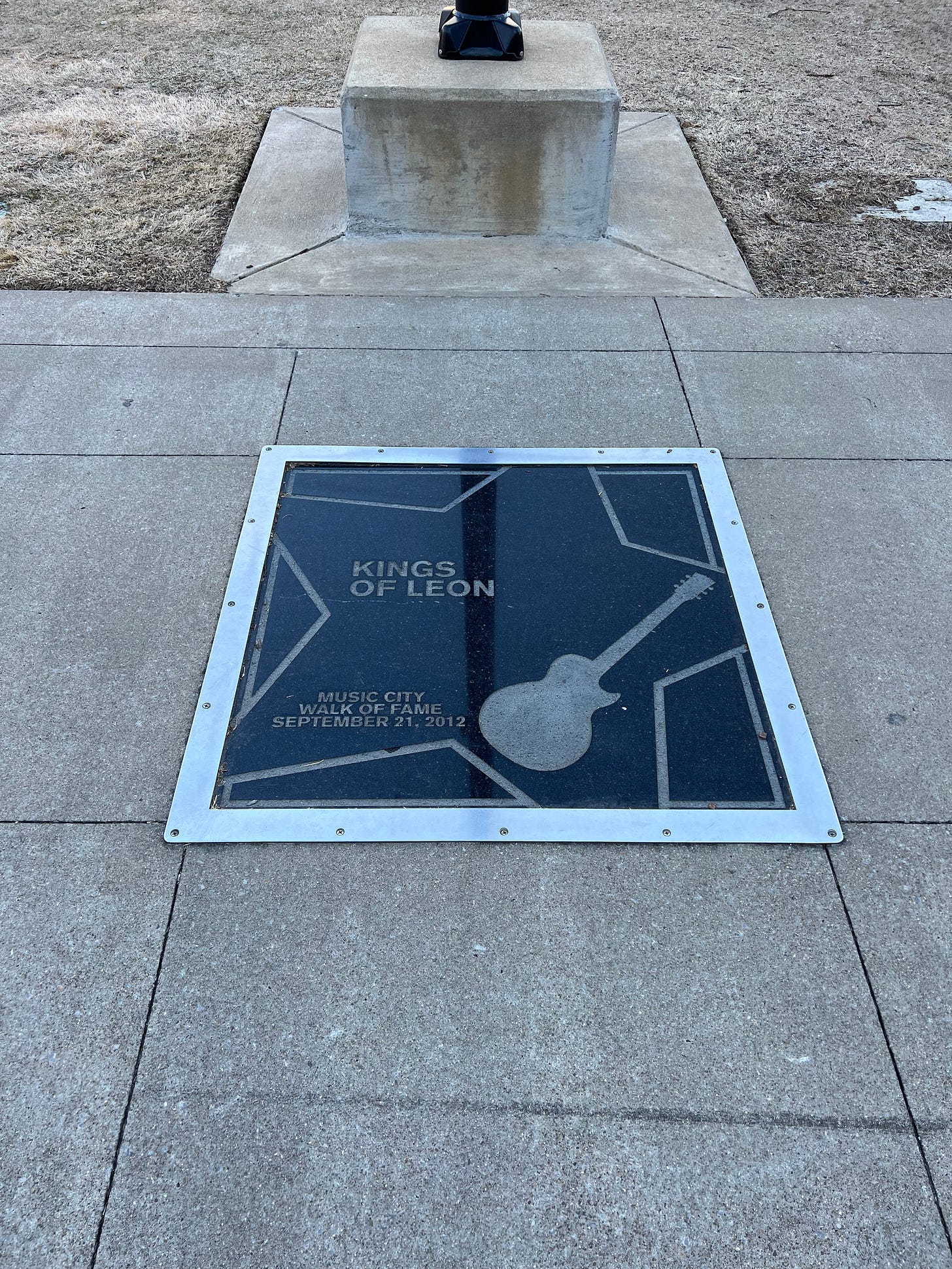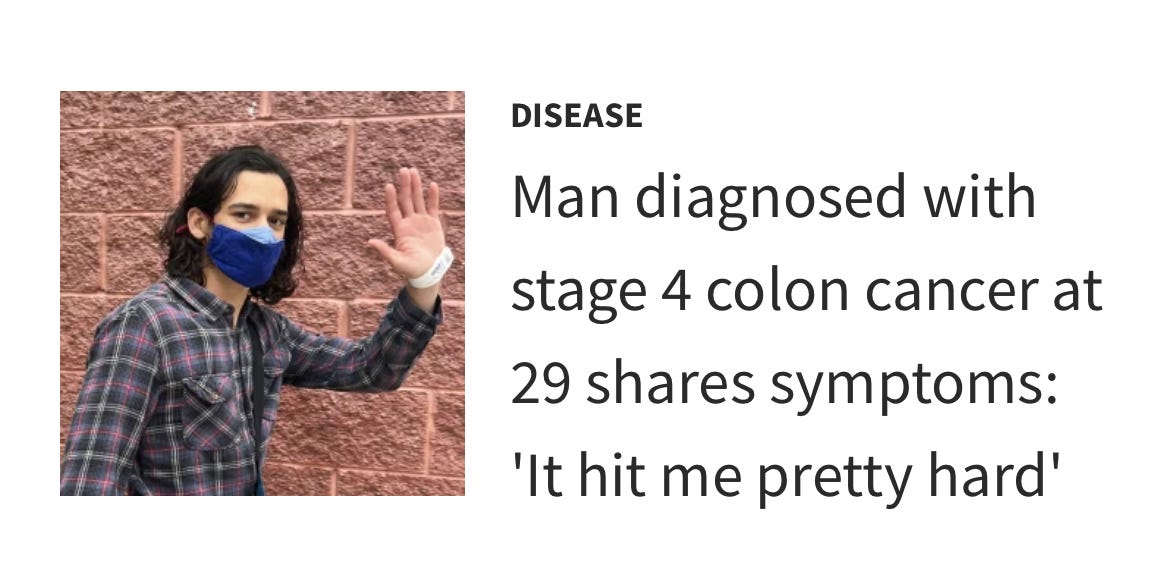I think I’m at the point where I can say birdwatching is a real hobby of mine.
I’m an amateur, but I go full Tony Soprano when a bird even a little more exciting than a little brown Common Trash Chickadee comes into my backyard. I was ecstatic when a pair of blue jays set up shop nearby, and sad when they stopped coming around. Last week I got really excited about a woodpecker that hung out on the cable wires outside my window. Don’t even get me started about the time a wood duck (female) glided up to where I was sitting by the river one day.
While in Nashville this week for work, with spare moments of time here and there to go walk around, it was impossible to avoid the birds.
I was never really a country music guy growing up. When I was much younger, I was one of those people who’d say that they like “any music except country.” I also would say for a long time that I hated emo music, despite some of my favorite bands being Jimmy Eat World, Saves the Day, My Chemical Romance, etc. I was, what you’d call now, a dope, and I obviously appreciate quite a bit of country music beyond a lot of the pop country out there now. It wasn’t so much that I changed my mind, I just learned more about it and was exposed to more, better things over time.
When I was a junior in high school, I got my first job bussing tables at Texas Roadhouse in Camp Hill, PA. If you’ve never been to a Texas Roadhouse restaurant, it’s pretty much exactly what you’d think it is. Fried food, steak, sugary mixed drinks and watery beer, lots of wood. Most importantly, lots of country music.
Exclusively country music, in fact.
The jukebox, which stood at the front next to the host station, was free, but they were all country songs – mostly your typical pop country fare that I just disparaged. There was some Johnny Cash, and I’d spam the jukebox to play a lot of Merle Haggard since that was one of the few artists I allowed myself to enjoy from that genre at the time.
Being that it was 2008 to 2010, though, we were getting a lot of the newest Nashville sensation, Taylor Swift.
When I hear certain country songs now, I am instantly transported back to Texas Roadhouse. I’m wearing a T-shirt that shrunk too much in the wash, but they wanted to charge me $20 for a new one so I stuck it out. My giant black service industry shoes are coated in grease and flour with bits of gunk and sludge between the grooves on the bottom. I’m scraping a child’s mac and cheese out from between booth cushions, or sweeping up the peanut shells that a whole youth basketball team just dumped on the floor.
You could do that there. There were barrels of peanuts that were god knows how old. We used the shells to clean up spills (or vomit). We also used to practice throwing the peanuts high in the air and catching them in our mouths. At one point I could throw them over the rafters of the restaurant and bank them off the wall into my mouth. I got my manager to buy me dinner once for doing it.
We also played a game called “throw peanuts into the hole of the guitar mounted over the bar.” Some day when that Texas Roadhouse closes and they start tearing it down, hundreds of peanuts (and maybe a few mice) will fall out of that guitar.
I took that job because I was a teenager and needed a job, and I knew some people who worked there. I went in one night and got hired on the spot. Over the two years or so that I worked there leading up to high school graduation and leaving for college, my relationship with country music didn’t change much. Now, I still hear certain songs and cringe a little, but it’s not the song’s fault. It’s mostly the war-like flashback to the restaurant work.
More than that, though, I realized during my time at Texas Roadhouse that the movie Waiting was a deadly accurate depiction of working in a junky chain restaurant.
Not in that we spit in your food, mind you. I truthfully never saw anyone mess with a customer’s order. Honest. I have exactly zero reasons to defend Texas Roadhouse, so I would not lie about that.
What Waiting got right was the way you’d have to put on your best service industry “the customer is always right and it is my pleasure to serve you until my dying breath” smile, only to immediately drop it to a scowl once back in the safety of the kitchen. At that point, you were free to say endlessly terrible things about the customer. If you are wondering if something you did was too much or inconvenient to a server, it was.
It nailed the cliquey-ness of restaurant worker social lives. The dynamics between the different employees.
Mostly what “Waiting” got right was the way a shitty restaurant like “Shenanigans” or Texas Roadhouse took in young people with aspirations and held onto them. It erased what was once there and coded in something totally different.
In the movie, Justin Long’s character goes from a server who is within the same caste as the rest of the staff to a manager. As soon as the idea of a managerial position is dangled in front of him though, things change. He’s no longer one of them. He’s a boss now.
A traitor. A cop. Ironically – a loser.
I worked with those people. They would come back between semesters in college, where they majored in things besides restaurant management. They’d joke around with the rest of us. Slack off to watch baseball every now and then. Joke about the managers. Throw peanuts into stuff. But, a few took manager jobs, and even dropped out of school, becoming full-time “roadies” for life. Now, mind you, having that job alone is no sin nor is it anything to look down on.
It’s that the change from a T-shirt to a polo shirt changed something in their personality, too. They were no longer “with us,” so, therefore, they were against us.
One waiter-turned-manager tried his best to lord some authority over me and the rest of the bus boys by doing things like trying to make us do the little dances Texas Roadhouse servers are known for doing, but bus boys are NOT. People sure loved something that delayed food service and clogged up the aisles.
I avoided getting sucked into the Roadhouse void and went through with my plan to go to college come August. On my last day at work, this manager gave me my last tip share and told me any time I want to come back and work here, I was welcome. I earnestly thanked him for the gesture, got in my car, drove to my friend’s house, and threw my Texas Roadhouse shirt in the fire he had lit by the creek without saying hello to anyone sitting around it. I was out, and I haven’t stepped foot in one since.
“The Ben Show” was a short-lived show on Comedy Central in the early 2010s. Comedy Central was giving shows to up-and-coming comedians to try to re-capture the lightning of guys like Dave Chappelle, and at the time gave shows to Ben Hoffman and Nathan Fielder. Hoffman’s sketch comedy ventured into the absurd and even played on themes of mental health, but one sketch that always stuck out with me was when he pretended to be a country musician named Wheeler Walker, Jr. As Walker Jr., he played a song that started with traditional overly masculine sexual and violent exploits, but ventures into homosexuality, prompting confusion and anger from the audience that liked the first part of the song. It’s a little like Sasha Baron Cohen’s Bruno as “Straight Dave” wrestling persona within another persona.
“The Ben Show” didn’t last long. Comedy Central reportedly had to choose between Fielder and Hoffman, and they chose Fielder. But Hoffman moved onto other projects, like keeping that Wheeler Walker, Jr. character alive as a recording artist and alter ego.
In probably 2015, when I was covering concerts in Philly a lot for local music magazines, I got an email that I could go to Wheeler Walker Jr.’s show in Philly if I wanted to. I had nothing else to do, I thought Hoffman was reasonably funny from what I had seen, so I went.
When I got there, I realized that just about everyone else in the crowd wasn’t in on the joke, or maybe I wasn’t in on what was actually happening. This was still in the pre-Trump era, where a lot of people still kept their beliefs and opinions quiet enough to not upset the rest of society. Especially being in Philadelphia at a music venue, I figured that the crowd would be full of comedy people who got what Hoffman was trying to say through songs littered with crass lyrics about women and drinking and fighting, where a musician was taking the piss out of country music tropes to point out societal flaws.
Instead, I heard guys in line for the bathroom and bar rattling off homophobic slurs, like the environment allowed them to do that. The fratty crowd – though not exactly a sold-out show, hence why I got the invite to go probably – just took all of the lyrics at face value. Ate it up. Totally separated from any irony or satire that Hoffman might’ve originally intended. It sucked and I left.
Though it’s unfair to country music at large, this show didn’t help strengthen my relationship to the genre.
In the years that followed, into the Trump years, Hoffman appeared as his Walker character on the Joe Rogan podcast. It’s interesting looking back now, because it makes me think that Hoffman was just a little bit ahead of the curve in his “I’m just challenging free speech and censorship” act. It’s all the rage right now. I’ve since wondered whether Hoffman leaned into the Wheeler Walker Jr. schtick as a way of staying relevant, or if this was even something he always wanted to pursue more than the sketch show creator who included his therapist in sketch introductions. Which one was really the character?
There are a lot of country music fans in Nashville. In my opinion, Nashville is one of the biggest music cities in the country.
As I walked around the city trying to get a feel for it, it felt stressful. All of the bars lining Broadway have at least one band playing at all hours of the day. If there are three floors of bars, there are three bands playing. All of the windows are open, so some street corners might have twelve bands competing for your attention.
I got away from the cacophony just long enough to get to the area around the Capitol, and noticed a few monuments with names I didn’t recognize on them. I Googled John Sevier, who has a state government building named after him. Turns out he was a prolific killer of Cherokees, and his greatest rival was Andrew Jackson, one of the most notorious pieces of shit in history. Their rivalry was so great that they eventually faced off in a duel to see who was the ultimate bad guy. The Andrew Jackson statue was only a few feet away, just a little up the hill next to the Tennessee state capitol.
People I talked to told me how quickly Nashville is changing. Every city seems to be changing, really. Where there was once empty space or older homes, there are now mixed use housing/retail buildings or shitty houses meant for young people to repopulate historic neighborhoods. New restaurants doubling as music venues with some modern country star’s name on the front and a rooftop patio. I talked to one local musician about how the beloved venue Exit/In is almost certainly destined for closure, destruction and replacement by something unremarkable.
The whole city is littered with those damn scooters, too. I hadn’t seen anyone riding them even once, but they’re left haphazardly on the sidewalk like some nuclear shadow or remnant of a rapture. Like people just disappeared. But it’s the opposite. The scooters mean people are coming.
These things happen to cities like Nashville or Denver or Austin or countless other American cities, where people move in, remove the things that were there already, and reshape the place to their liking, leaving motorized scooters all over the sidewalk, prioritizing cars over pedestrians to the point where signs make sure you smile and make eye contact with the person about to vehicularly homicide you.
I thought about the spirit of John Sevier and Andrew Jackson, and how they oversaw the changing Nashville from on that hill, and probably felt proud that there was a continuation of their mission to come to a new place and ruin lives for their own sake. Manifest Destiny.
I hoped that spending a few days in Nashville, even in the center touristy area, would allow me to feel some sort of connection to the rich history of country music. But it didn’t. After checking into my hotel, the first thing I saw as I left to find a cup of coffee was a music walk of fame, with little sidewalk squares honoring musicians like Loretta Lynne and Johnny Cash. It also included this:
I’m not a historian on all things Kings of Leon, but they feel like an apt metaphor for cities like Nashville. Those first couple of Kings of Leon album had some genuinely good songs on them. The guys in the band were not handsome. They looked dirty and played some pretty solid, but not particularly sexy, southern garage rock. “Four Kicks” still rips. But, over time, they saw the value in settling into a more marketable aesthetic. They cut their hair, they paid more attention to their clothes and they put out songs like “Sex on Fire.” I don’t know whether they chose that or it was a Sevierian producer who swooped in, effectively “killing them” and rebuilding them to be what he thought they should be for the sake of commerce.
Whatever it was, it worked enough to get a square next to Steve Winwood, where scooters will roll by on the way to another museum celebrating music and artists who could no longer afford to live here, or a bar meant to feel like a dive bar where a Shiner Bock beer costs you $8.
There will always be invasive species that introduce themselves to an ecosystem. Some are more harmful than others, but their presence is always known.
Today’s Snakes and Sparklers musical guest is Superbloom.
Some fun links:
I just interviewed Greg Attonito from Bouncing Souls about their new album “Ten Stories High” for Brooklyn Vegan. I’ve loved Bouncing Souls forever, so this was really cool. The story of the album is really cool, too. During lockdown, they met with fans on Zoom and turned their stories into songs. Some are funny, some are deep, and it allowed the band to find inspiration from a new source after three decades together, and let them connect with fans in a new way.
Also, I just got interviewed by the Today Show website about being a young person with colon cancer. The story doesn’t read exactly like how I would tell it, but that’s not my choice. Not my article. They did cut all of the diatribes I went on about the evil aspects of the U.S. healthcare system, like how it’s almost impossible for a young person to get a colonoscopy, despite evidence showing that it’s affecting younger and younger people, and how if they do get recommended it can be prohibitively expensive.

